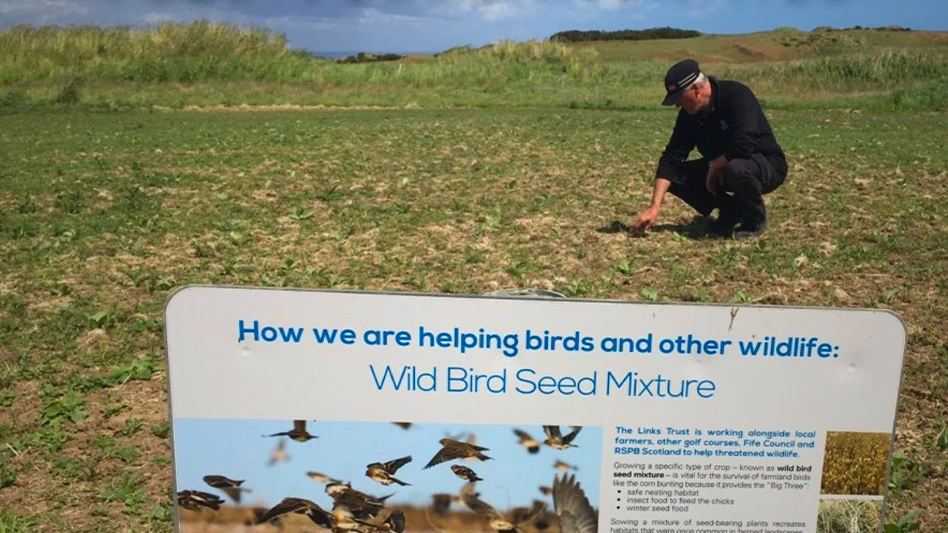The industry values the people of its future like a child values a stuffed animal or blanket. Once again, that was evident at Jacobsen’s annual Future Turf Managers Seminar, which returned in May from a brief hiatus. The program, which had its 31st session this year, started in 1971 and has had more than 600 students participate throughout the years. This year was the first time it was held at the Jacobsen University training center at the company’s new headquarters in Charlotte, N.C.
The program provides participants with an opportunity to learn and interact with turf professionals in an educational environment under the guidance of industry leaders.
Fourteen turfgrass students and recent graduates from throughout the country attended this year’s event, which included plant tours, equipment testing, golf course visits and guest speakers.
Mark Wilson, CGCS, at Valhalla Golf Club in Louisville, Ky., was one of the speakers. Wilson gave attendees advice about entering the superintendent profession and golf course maintenance industry. Wilson, who has been in the business for 36 years, a superintendent for 26 years and at Valhalla for 18 years, has survived the ups and downs of the business, including dealing with millionaires and workers who could barely read and write.
“It’s not about the money,” he says. “It’s the value of what you do. Love your job, be humble no matter what, and have a good work ethic. At the top of the profession it’s still very prosperous.”
Wilson says he has always been around good people. He employs 25 to 35, many of whom who have turfgrass degrees, and hires five interns a year. He has three assistants (who make $35,000 to $40,000 a year) – one in charge of the front nine, one in charge of the back nine and one in charge of the grounds. He has one full-time worker for every three holes.
“The past 10 years, I’ve always promoted from within,” he says, adding that assistants can expect to put in 60 hours a week.
Currently, Wilson and his staff are renovating the course in preparation for the 2008 Ryder Cup, which he says will generate $125 million of economic impact the week it’s in Louisville. For tournament preparation, there will be 70 volunteers and 30 staff workers to maintain the course. The $3-million renovation includes:
• Renovating 14 holes;
• Regrassing all greens;
• Rebuilding five greens;
• Building a $400,000 waterscape;
• Rebuilding three new tees;
• Renovating all bunkers; and
• Lengthening the course to 7,515 yards.
The course, which opened in 1986, featured Penncross bentgrass on the greens. Now they’re being changed to an A-1/A-4 bentgrass mix. Renovating the greens includes stripping the sod 1 inch, aerifying 3 inches deep, deep tining, making slope changes, applying methyl bromide then seeding. After the greens are grown in, they’re mowed as soon as possible. During the grow-in, Wilson applies fertilizer every week.
“It takes two weeks from the time you seed to the first mow, and you have 95-percent coverage,” he says, adding that A-1 grows in more quickly than A-4.
Valhalla, which is owned by the PGA of America, has 250 members and a liberal guest policy, Wilson says. It generates between 18,000 and 20,000 rounds a year, 60 percent of which are with caddies.
Before coming to Valhalla, Wilson worked at public and private courses in Ohio, Florida and Kentucky.
“At a high-end course, you’re basically a people manager,” he says. “You make decisions and motivate people. The team concept is important to wipe out any big task. You find solutions to problems. The trend is how quick can you fix things.”
Wilson believes one out of every five turfgrass graduates eventually will become a golf course superintendent, pointing out some of the harsh realities of the industry, including that of 250 golf courses in Kentucky, 50 have budgets of a half million or more, and seven out of 10 golf courses are struggling.
Another speaker, Fred Gehrisch, CGCS, at Highlands Falls Country Club in Highlands, N.C., emphasized the need to be a member of local, state and national superintendent associations to reach the top of the profession. Associations have relationships with professors and help get students jobs. Associations also provide benefits such as:
- Research
- Networking
- Education
- Scholarships
- Industry promotion
- Lobbying
- Best practices
- Political power
- Public relations
- Retirement programs
- Insurance
- Discussions forms
- Seminars
- Trade shows
- Marketing tools
- Resume service
- Career development
- Negotiating.
Gehrisch advises those entering the profession to work through superintendent associations to volunteer at major tournaments.
Gehrisch, who is working to finish his MBA, also emphasizes continuing education. He says being certified helps superintendents land jobs in the top 20 percent of the market.
Jeff Kent, golf course superintendent at Quail Hollow Country Club in Charlotte, N.C., told attendees they need to want a job more than the next guy. Preparedness is the key to moving up in the profession, he says.
“You need to make sure you’re prepared as much as possible before you say you want to be a superintendent,” he says. “You need to swim at the deep end of the pool and swim with the sharks to know if you can do it. It’s tough to get into the business and get to the top. Details are important. Set yourself apart and surround yourself with good people.”
The panel of Wilson, Kent, Texas Agricultural Experiment Station Research & Extension Center professor Milt Engleke, Ph.D., and Clark Cox, sports turf manager for the University of South Carolina, gave other advice to attendees:
- Know some Spanish.
- Know the game of golf.
- A degree qualifies you, but doing hands-on work is an important part of the learning process.
- Work at a top club and at a smaller club where you do it all.
- Volunteer to work preparing for tournaments. It’s the little things that count.
- Grin and bear it. There’s no room for whining. You need to be willing to put in the time.
- Be able to explain agronomics in layman’s terms and the consequences of your agronomic decisions.
- Sacrifice, work late and work overtime. Be patient because you won’t be on a fast track to the top of the profession.
- Las Vegas is a hot market right now for golf. Go there to get in on the ground level of a project.
- Be willing to relocate.
Feedback
Steve Loughran, one of the attendees, will earn a Bachelor of Science degree in urban horticulture and turfgrass management from the University of Rhode Island in December. Currently, Loughran is an assistant-in-training at Fairview County Club in Greenwich, Conn. Loughran, like the rest of the group, was nominated by one of his turfgrass professors to attend the program.
“I thought it would be a great opportunity to network with peers with the hope of becoming a superintendent,” he says about attending the seminar. “The Jake staff treated us like professionals, not students. This was geared for us. It was awesome that we had so many guys we could talk to about different concepts and ideas about running premier golf courses. Jeff Kent shocked us all back to who we really are and the difference of the industry compared to 25 years ago. This event is a resume builder.”
Jason Frank, a 2005 University of Florida graduate with a degree in turfgrass science, is in graduate school earning a master’s degree in turfgrass science. Frank says he’s always looking to meet new people and learn new things.
“Everyone has four-year degrees,” he says. “It’s things like this that set you apart and further yourself. All the prominent members in the industry that spoke on a personal level stood out. Jake brought these tops guys in to advise us and help us get to where they’re at. Attending this event might open connections in the future. Maybe a job opens up, and somebody I saw here could open a door, or maybe a job opens up with Jake. As a result of all the networking with other students here, maybe we each know of a job opportunity.” GCI

Explore the July 2007 Issue
Check out more from this issue and find your next story to read.
Latest from Golf Course Industry
- Heritage Golf Group expands into Tennessee
- Making the grade — at or near grade
- PBI-Gordon receives local business honor
- Florida's Windsor takes environmental step
- GCSAA names Grassroots Ambassador Leadership Award winners
- Turf & Soil Diagnostics promotes Duane Otto to president
- Reel Turf Techs: Ben Herberger
- Brian Costello elected ASGCA president





